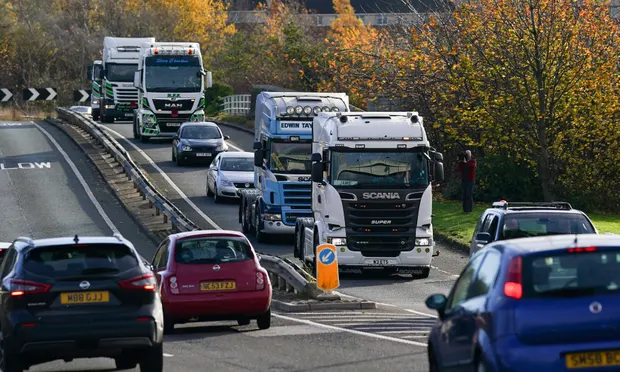The UK government is refusing to release the carbon emission figures behind its transport decarbonisation plan, which campaigners say could make proposed road schemes financially unviable, including data on how much car use would have to be reduced in order to reach net zero commitments.
Campaigners say meeting these legally binding targets will be possible only with a drastic reduction in motor traffic, which could make many new road projects financially unviable.
There are 32m cars on the UK’s roads, and they are growing both in number and size as transport is the largest emitting sector in the country, and produced 24% of the total in 2020.
Last week, the DfT published the first long-term road traffic forecasts since 2018, and the first since the 2050 net zero targets were signed into law in 2019.
Prof Greg Marsden, of the University of Leeds, said the figures showed the sector breaching carbon targets and not meeting its own carbon reduction plans. He has submitted a complaint to the Information Commissioner’s Office (ICO) demanding the figures be released.
Read also: Met Office predicts a hotter 2023 for UK residents
The projection shows that car use will increase or remain stable. It says: “In the high economy scenario, car trips increase over time. In contrast, in the low economy scenario, car trips remain relatively stable until the 2040s, from which point they begin to decrease.”
However, scientists say a shift to electric vehicles alone is not enough and car use needs to be drastically reduced in order to meet net zero targets, with some reports showing that a reduction of at least 20% is needed by 2030. None of the projections from the DfT show this.
Marsden said: “The key question is: why is it OK to release information about scenarios which are not government policy, but not to release information about scenarios which are?”
The ICO agreed with Marsden, ruling: “The commissioner considers that there is a very strong public interest in the publication of data that will assist the public in understanding policy decisions – especially those designed to be as far-reaching and long-lasting as the transport decarbonisation strategy. Disclosure will help the public to understand where the government’s proposals are too ambitious, not ambitious enough or about right.”
However, the DfT has appealed against the ruling, further delaying the publication of the figures.
The department claimed it does not have to submit its workings on the decarbonisation plan as it is a “live policy”.
“It is submitted these should not be disclosed because they are, in effect, the foundation of future policies in the making and are therefore to be considered live policies. Such information should not be disclosed because this may lead to an inhibiting effect on discussing and developing those ideas,” the department argued.
Story was adapted from the Guardian.
